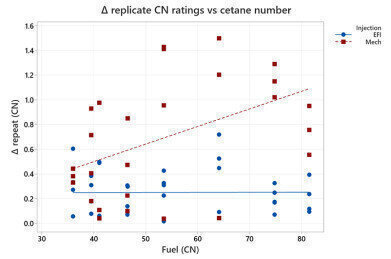Analytical Instrumentation
Cetane engine with electric fuel injection system provides dependable solution for precise cetane number measurement of renewable diesel
Aug 16 2022
The production of renewable diesel continues to expand as low-carbon fuel policies incentivise the use of fuels with low life cycle CO2 emissions. The most current data available from the U.S. Environmental Protection Agency (EPA) reports that the United States consumed over 960 million gallons of renewable diesel fuel in 2020, with about 40% of this volume being imported. Projections for renewable diesel production capabilities within the U.S. are expected to increase from current levels of 600 million gallons per year to 2 billion gallons per year in the near term. (Renewable diesel statistics are from the U.S. Department of Energy Alternative Fuels Data Center).
CFR Engines Inc. (CFR) is continuing with development testing of an F5 cetane engine fitted with a modern high-pressure electronic fuel injection (EFI) system. CFR XCP™ technology in combination with a modern fuel injection system allows for precise control over the quantity and timing of each fuel injection event. The result is improved cycle-to-cycle consistency between combustion events and a precise measurement of Cetane Number (CN).
The CFR F5 EFI system makes it possible to expand the cetane number range in accordance with ASTM® D613. Currently the published D613 precision covers diesel fuels in the range of 40-56 CN. Renewable diesel fuels (HVO, HDRD) typically have ultra-high cetane values often exceeding 70 CN, while alternate (non-renewable) diesel fuels such as gas-to-liquids (GTL) can have cetane values that exceed 80 CN.
Significant progress has been achieved as CFR Engines Inc. continues to improve the F5 cetane engine capability to rate diesel fuels with ultra-high cetane values. Several fuels of varying cetane levels were rated twice on each platform (mechanical and electronic fuel injection), then the difference between replicate ratings was plotted versus cetane number. The results indicated that the EFI system will provide improved repeatability as the applicable range of ASTM® D613 is extended beyond 80 CN.
Digital Edition
PIN 25.3 June/July
June 2024
Analytical Instrumentation - Recent Advances In Various Bench Scale Accelerated Oxidative Testing Methods For Fuels - Petrochemical Industry: Anton Paar Solutions Streamline Processes, Reduce H...
View all digital editions
Events
Jul 30 2024 Jakarta, Indonesia
Jul 30 2024 Jakarta, Indonesia
China Energy Summit & Exhibition
Jul 31 2024 Beijing, China
Jul 31 2024 Chengdu, China
Aug 05 2024 Moon Township, PA, USA


















